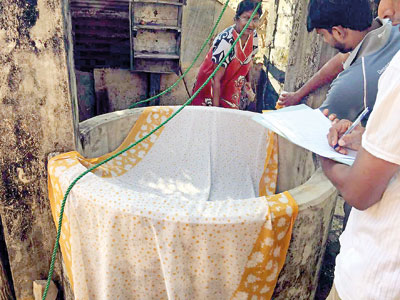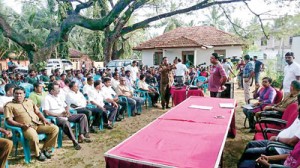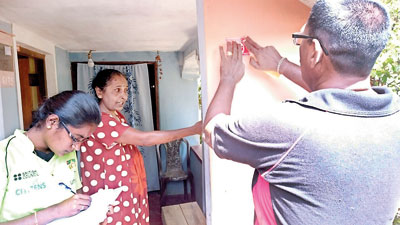News
Dengue epidemic overwhelms Batticaloa: 1,500 cases in three months
View(s):
Awareness programmes and clean-up operations being conducted in Batticaloa in the wake of an increase in dengue cases. Pix by Adhiran
More than 1,500 dengue patients have been admitted to hospital in Batticaloa in the past three months and Kaththankudi dealt with 800 cases in 10 days as the district struggles with a deadly dengue epidemic.
Three patients died this week. Across the country the death toll has risen to 53 from January to March.
Batticaloa Hospital director Dr M. S. Ibralebbe told the Sunday Times that the number of dengue cases has been rising every month.
“In the first three months the hospital received 1,519 dengue patients. The number of dengue patients admitted last year were only 501. It is clear that the hospital is facing a peak in the number of cases reported this year,’’ he said.
Dr Ibralebbe said patients from Kaththankudi and other areas of the Batticaloa district were also admitted to the Batticaloa Hospital.
The highest number of patients was from the Batticaloa Municipality area, Eravur and Kaththankudi.
The situation in the Kaththankudi area has been worsening during the past 10 days, Kaththankudi District Hospital Director Dr. M S M Jabir said.
“We treated over 800 patients in the past 10 days. Those were very challenging 10 days for us,” he said.
Dr Jabir said that on Friday there were 81 patients and 69 patients on Thursday. However there were no deaths reported in the Kaththankudi Hospital.
“With the staff working round the clock and outsourcing staff from nearest hospitals the hospital has managed to reduce the number of patients now,” he said.
The regional epidemiologist of the RDHS Batticaloa, Dr Dharshini Murugupillai told the Sunday Times, that there are more than 1,300 confirmed dengue cases in the Batticaloa district.
“The peak is reached once in five years. The highest number of cases is reported from Batticaloa, Kaththankudi and Eravur,” she said.
She attributes the rise in cases to wells and overhead tanks being possible mosquito breeding grounds. Fingerlings have been introduced into wells and the wells have been covered with nets, she said.
She said that the three who died were two adults who have been working in Colombo and the other was a nine-year-old girl from Kaththankudi.
“We are conducting an awareness programme with the assistance of the Municipal Council, Urban Council and the Provincial Councils. Public interest is gradually increasing after the deaths in Kinniya,” she said.

Local programmes are carried out by the Medical Officers of Health island-wide said Dr. A R M. Thowfeek, the director of the Dengue Control Unit. He said waste management also played a role in the spread of dengue. There is stagnant water in the piles of garbage that lies uncollected.
While municipal officials ask for public co-operation, in some areas, there are neither bins nor designated sites for residents to dump household waste.
One such area is Wattala where the residents face difficulties.
Wattala Pradeshiya Sabha secretary A. Irangani, told the Sunday Times that people do not separate their waste and some of them throw the garbage on the streets.
The issue of a proper dumping yard arose when residents of the area opposed dumping in one of the private properties bought by the Pradeshiya Sabha.
Ms Irangani said the garbage had been collected but there is no place to dump it. As an alternative, the waste is taken to Dikowita.


